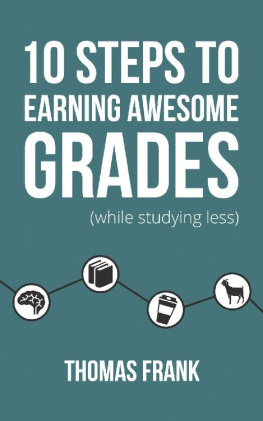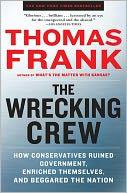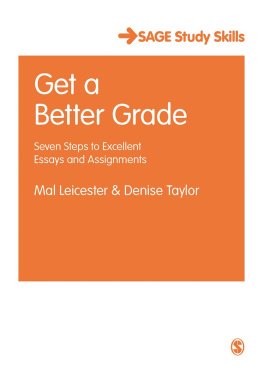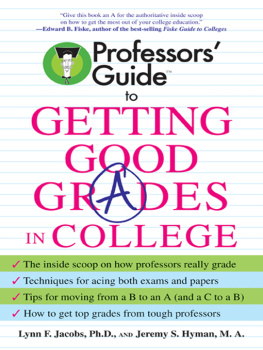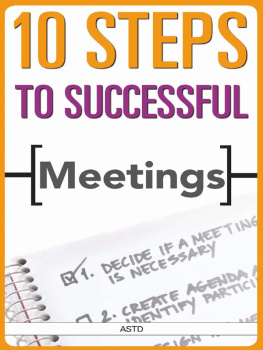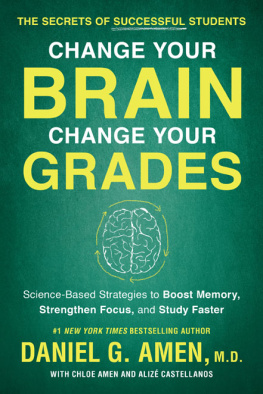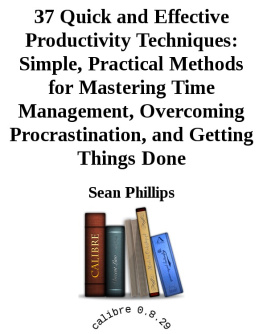Table of Contents
If you like what you read here, youll find tons more study tips, career advice, and other info on becoming an awesome college student at College Info Geek (collegeinfogeek.com). Copyright 2015 Thomas Frank (2016 Revised Edition) All rights reserved. Done with the help of coffee and more coffee. Thanks to all the students who helped edit the first draft of this book! - Ransom P. - Victoria C. - Clayton B. - Audrey C. Cover icons: - Coffee symbol is by Edward Boatman. - Book symbol is by Dmitry Baranovskiy. - Goat symbol is by Anand Prahlad. - Brain symbol is by anonymous, public domain. All icons are from thenounproject.com. |
Introduction
There is a goat icon on the cover of this book because putting it there made it easy to start this introduction. Also, goats are hilarious.
Moreover, goats are really smart, and theyd probably get damn good grades if they stopped yelling long enough to think about goat school.
Enough about goat grades, though - this book is meant to help you improve your grades.
A couple facts to put out there before we begin:
For most students, my opinion on grades is that they do not need to be perfect. After you define your goals, youll find that your coursework is not a magical Hogwarts train that will take you to them. Itll help, but alone its inadequate. Focus on getting good grades while also gaining skills outside of class, building things, doing extracurriculars, making connections and - yes - making time to have fun. Even if its just playing 10 minutes of Goat Simulator (dont worry, thats the last goat joke).
The main point of this book is to help you earn better grades, but the almost-as-important sub-focus is to cut down your study time. Its my aim here to give you tools and tactics that help you perform better in less time. Theres a neat little equation I invented below that explains this a little better.
The Study Time Equation
What are the factors that actually go into earning awesome grades? In my mind, the best way to look at this is to envision the final goal not as the tangible reward - the grade - but rather as the state of being you want to achieve.
I define this as Desired Preparedness. This applies to any class youre in - or, to get more granular, to any specific exam/assignment/project.
The grade is simply a result you can use to quantify your desired preparedness. Once youve set that goal, there are four factors that will go into achieving it.
- Class Time
- Learning Quality
- Study Time
- Study Efficiency
Given those factors, heres the initial form of the equation:

Pretty simple, no? Now we just do some algebraic fiddling to solve for Study Time:

Assuming youre committed to attending all your classes, Class Time is fixed. Its a constant. If youve already set a goal for Desired Preparedness, thats fixed for now as well.
This means youve got two variables to work with: Learning Quality and Study Efficiency. To decrease the amount of time you need to spend studying, increase either of them. Or be a baller and increase both.
Book Overview
The rest of this book is dedicated to giving you strategies and tactics to do just that. Ive organized the book into 10 steps, each of which covers a different skill area:
- Paying Better Attention in Class
- Taking Effective Notes
- Getting More Out of Your Textbooks
- Planning Efficiently
- Building Your Optimal Study Environment
- Staying Organized
- Defeating Procrastination
- Studying Smarter
- Writing Better Papers
- Making Group Projects Suck Less
I called them 10 steps, but you should actually think of them as levels in a Mega Man game - you can take them on in any order. Just as you get new power-ups and weapons after each level in the game, youll get stronger after completing each step here.
It doesnt actually matter which one you start with - if youve got a particular problem area, skip to that section and start implementing the tips you find there before you try to load everything else into your brain.
The words of CD Baby founder Derek Sivers fit perfectly here:
Ideas are just a multiplier of execution.
Multiply anything by zero and you get zero. Youll be a lot better off if you just read one step of this book and put it into action than if you read the whole thing and proceed to do jack.
Keeping that in mind, lets take on the first robot masterer, step.
Step 1 - Pay Better Attention in Class
Since your Class Time is a constant rather than a variable, I think it makes sense to prioritize Learning Quality first. The more you can learn while youre part of your professors captive audience, the less work your Study Efficiency will have to do later when youd rather be hanging with friends and playing Fibbage (the best party game ever, I might add)
The first step to upgrading your learning quality is deceptively simple: Pay better attention in class.
This is one of those easier said than done pieces of advice; semesters are long and classes constantly wage a war of attrition against your motivation levels. These strategies will help you weather the storm.
Dont Overload The System
I had a professor in my MIS program who was quite the character. In addition to praising the Google at least twice a week and sending students on extra-credit missions that involved photographing Cabbage Patch kids in weird locations - like Intels chip manufacturing facility - hed also end every class by saying,
Dont overload the system!
The system he was referring to is your brain, but Im going to take it a step further and define the system as your body.
This isnt a huge stretch, actually; Elliot Hulse, a strongman/fitness personality with over 1 million subscribers on YouTube, has a key philosophy that your body is your mind.
Your mind does all the work involved in earning awesome grades, and the performance of that mind is dependent on the state of your body. As Elliots YouTube intro video eloquently puts it:
The most important part of the game is your game piece!
I go to the bookstore and look at the college prep section a lot (its an upgraded version of a motivational technique called visualization) since I want to see my work there some day. Almost every college success book I thumb through mentions health somewhere
but it still bears repeating. Why?
The truth is that most of us are like the kid who goes to karate class and wants to learn flying tornado kicks before mastering proper balance. We want little tricks, hacks, and tactics that promise to make our lives better.
However, all the little mind hacks and study tricks in the world wont help you if youre constantly suffering from bad health due to poor nutrition, lack of sleep, and inadequate exercise.
Picture two ninjas: One keeps his body in top form and practices every day, but his masters a hard-ass and only lets him fight with his bare hands.
The other actually isnt a ninja at all - hes just an unhealthy anime addict yelling quotes from Naruto and holding a $5,000 katana bought for him by his rich dad.

